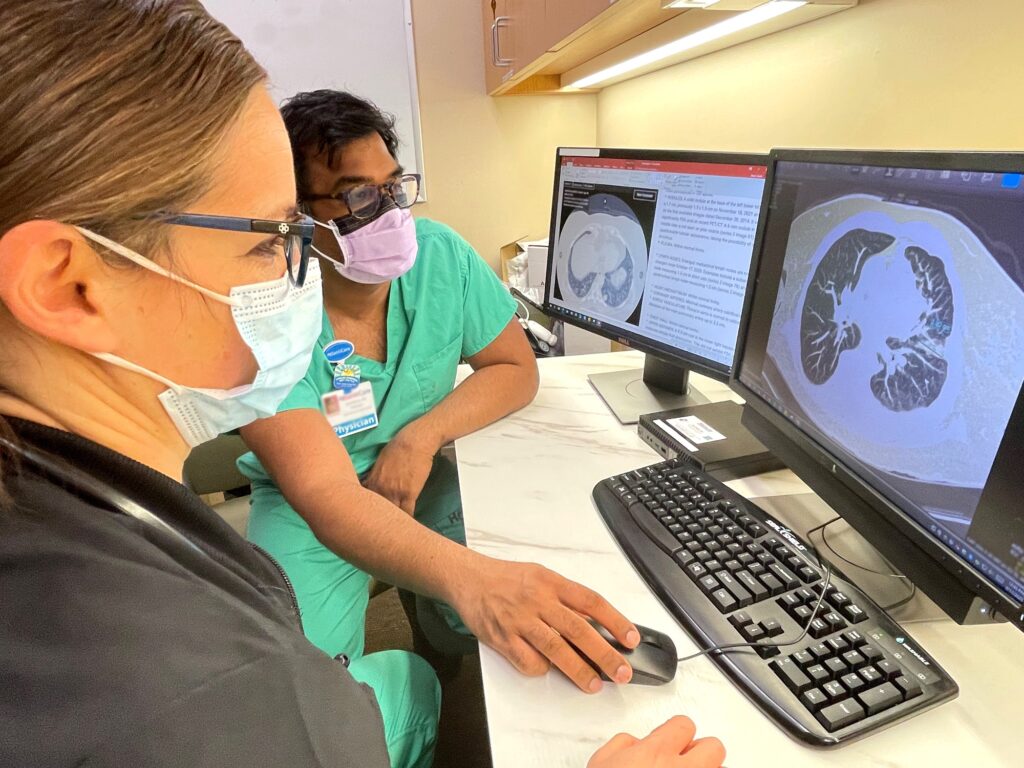 Provided/Sarah Dean, APN and Amit Borah MD view an Optellum scan.
Provided/Sarah Dean, APN and Amit Borah MD view an Optellum scan.
Artificial intelligence. Better known as AI. It wasn't that long ago that the concept of AI and all the astonishing impacts it could achieve were reserved for the world of science fiction and, perhaps, as a possible tool for generations down the road. But today, the future is here. AtlantiCare is using AI to provide extraordinary care by detecting one of the hardest cancers to detect in early stages.
In October 2022, AtlantiCare became the first healthcare system in the Northeastern U.S. to use the Optellum Virtual Nodule Clinic. By integrating the innovative AI technology into the early lung cancer diagnosis program at its Heart & Lung and Cancer Care institutes, AtlantiCare has elevated the way it diagnoses and treats lung cancer to drive better outcomes.
The Optellum Virtual Nodule Clinic offers the opportunity to spot lung cancer early in people who have no known risk factors, symptoms or otherwise may not have cause to be vigilant about their lung health. AtlantiCare uses the AI-driven technology on every CT and or PET scan they perform that captures all or a portion of the lung, allowing the team to incidentally detect miniscule, suspicious pulmonary nodules at the earliest stages. In addition, Optellum's integrated lung cancer prediction capability allows the team to prioritize at-risk individuals for monitoring and follow-up care.
Early-stage lung cancer symptoms are often vague or mimic those of other illnesses, said Amit Borah, M.D., interventional pulmonologist and leader of the Interventional Pulmonology team at AtlantiCare's Lung Nodule Clinic. Through this technology, we are detecting suspicious nodules at earlier stages than ever, which is so critical to saving lives.
When detected early and treated timely the survival rate for cancerous lung nodules can be as high as 90%.
AtlantiCare pursues this high rate of survival by pairing the groundbreaking Optellum AI with Ethicon's MONARCH" robotic bronchoscopy technology to reach and biopsy the smallest, hardest to detect tumors in the least invasive way. With this one-two punch AtlantiCare is taking lung cancer prevention, diagnosis and treatment to the next level, saving people from arduous lung cancer treatment, ultimately saving lives.
In the six months since AtlantiCare started deploying the Optellum Virtual Nodule Clinic, the technology has made a dramatic impact on their team and patients by conducting two to 15 CT and/or PET scans per day, notifying 17% of patients because their scans detected a lung nodule larger than 8 millimeters. In notifying patients of a potential issue, AtlantiCare also encourages them to follow up with their provider or the Lung Nodule Clinic within three months.
We have already identified lung cancer and/or suspicious tumors in individuals who have no known risk of lung cancer through this technology, Borah said. It will enhance the life-saving progress we've experienced since offering robotic bronchoscopy to our patients.
For more information visit AtlantiCare.org.